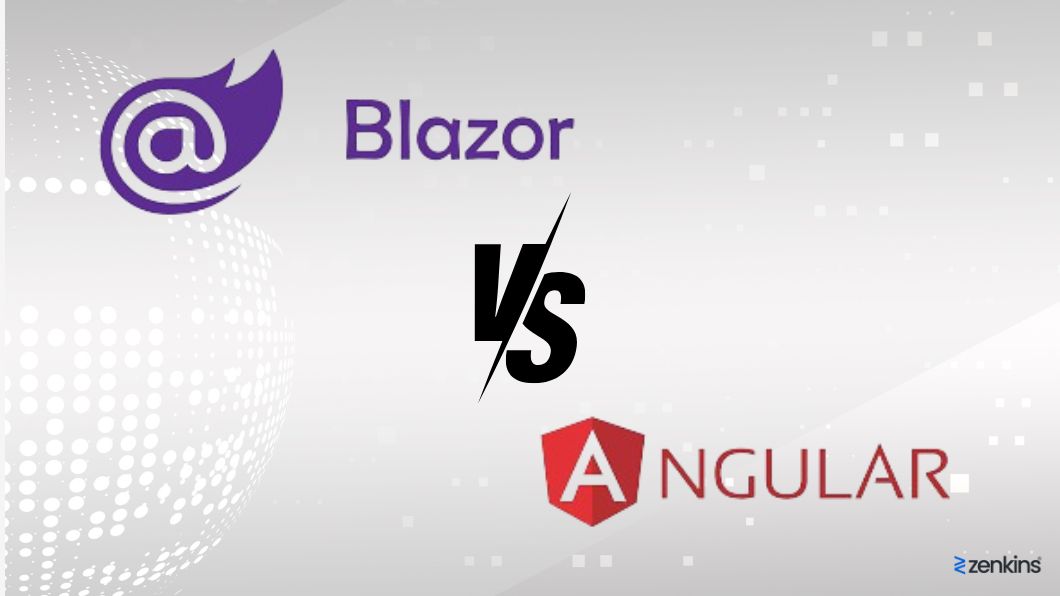Blazor vs Angular
Table of Contents
Blazor and Angular are two popular frameworks used for building modern web applications. Blazor, developed by Microsoft, is a relatively new framework that allows developers to build web applications using C# instead of JavaScript. On the other hand, Angular, developed by Google, is a widely adopted and mature framework that enables developers to create dynamic and robust applications using TypeScript.
In this article, we will compare and contrast Blazor and Angular, examining various aspects such as architecture, performance, development experience, community support, backend integration, learning curve, and more. By exploring the strengths and trade-offs of both frameworks, we aim to provide insights to help developers make informed decisions when choosing between Blazor and Angular for their web development projects.
Introduction to Blazor Vs Angular
What is Blazor?
Blazor is a relatively new framework developed by Microsoft that allows you to build interactive web applications using C# instead of JavaScript. It leverages WebAssembly, which is a low-level assembly-like language that runs in modern web browsers, to execute your .NET code directly in the browser. This means you can write front-end code in C# and achieve high performance without sacrificing the benefits of a modern web application.
What is Angular?
Angular, on the other hand, is a powerful JavaScript framework maintained by Google. It follows the component-based architecture and helps developers build dynamic and responsive Single Page Applications (SPAs). Angular uses TypeScript, a statically typed superset of JavaScript, to provide a more robust and maintainable codebase.
Architecture and Technology Comparison
Client-Side vs Server-Side Rendering
Blazor supports both client-side and server-side rendering. With client-side rendering, the entire application runs in the browser, allowing for a fast and interactive user experience. Server-side rendering, on the other hand, offloads the rendering to the server, reducing the initial load time. In contrast, Angular primarily focuses on client-side rendering.
Component-Based Architecture
Both Blazor and Angular follow a component-based architecture, which promotes reusability and modularity. Components encapsulate the logic and UI elements of your application, making it easier to maintain and reason about. Blazor and Angular each have their own syntax for creating components – Blazor uses Razor syntax while Angular uses HTML templates and TypeScript.
Read more about Blazor Vs. React For Building Modern Web UIs
Performance and Scalability: Blazor vs Angular
Loading and Rendering Performance
Blazor’s client-side rendering can provide a snappy user experience as it reduces the need for round trips to the server. However, initial load times can be longer due to the larger file sizes required by Blazor’s WebAssembly runtime. Angular, on the other hand, can have faster initial load times as it can leverage the benefits of server-side rendering.
Memory and Resource Consumption
Blazor generally has a higher memory and resource consumption compared to Angular, mainly due to the overhead of running the .NET runtime in the browser. This can have implications for the scalability of your application, especially if you’re expecting high concurrent user traffic. Angular, being a front-end framework without such runtime overhead, can handle larger scale applications more efficiently.
Handling Large Datasets and Real-Time Updates
When it comes to handling large datasets and real-time updates, Blazor’s client-side rendering can be advantageous. It allows for efficient data manipulation and updates without needing to make network requests, resulting in a more responsive user interface. Angular, with its reactive programming model and built-in support for RxJS, also handles real-time updates effectively.
Development Experience and Productivity: Blazor vs Angular
Language and Tooling Support
Blazor’s use of C# allows developers with a .NET background to leverage their existing skills and tools, making it easier to transition to web development. Angular, on the other hand, uses TypeScript, which provides strong typing and additional features that can help catch errors early during development.
Code Reusability and Modularity
Both Blazor and Angular emphasize code reusability and modularity through their component-based architecture. However, Angular’s mature ecosystem and extensive library of third-party components provide greater options for reusing code and speeding up development.
Rapid Prototyping and Iterative Development
Blazor’s use of C# and its tight integration with Visual Studio and other .NET development tools can provide a smooth development experience for developers already familiar with the .NET ecosystem. On the other hand, Angular’s CLI (Command Line Interface) and Angular Material offer a streamlined development workflow, making it efficient for rapid prototyping and iterative development.
Community and Ecosystem Support: Blazor vs Angular
The success and growth of any web development framework depend heavily on the support it receives from its developer community. After all, what good is a framework if there’s no one around to help you when you’re stuck?
Size and Activity of the Developer Community
When it comes to the size and activity of the developer community, both Blazor and Angular have strong followings. Angular, being around for a longer time, has a larger community overall. However, Blazor has been gaining popularity rapidly, and its community is growing at an impressive rate. So, if you’re looking for a vibrant community to connect with, you won’t be disappointed with either choice.
Availability of Libraries and Third-Party Integrations
One crucial aspect to consider when choosing a web development framework is the availability of libraries and third-party integrations. The more libraries and integrations available, the easier it is to extend the functionality of your application.
In this area, Angular has a clear advantage. Thanks to its maturity and widespread adoption, there’s a vast collection of libraries and integrations readily available. Blazor, being relatively new, doesn’t have as extensive a library ecosystem. However, it’s worth noting that Blazor can leverage existing .NET libraries, which opens up a wide range of possibilities.
Long-Term Support and Future Roadmap: Blazor vs Angular
Long-term support and a clear future roadmap are essential factors to consider when investing your time and effort in a web development framework.
Angular is backed by Google, which brings stability and reassurance. It has a well-defined release schedule and a roadmap that provides insights into upcoming features and enhancements. With its strong backing and continuous development, Angular is a safe bet for long-term support.
Blazor, on the other hand, is maintained by Microsoft. While it’s still a young framework, Microsoft’s commitment and support indicate a promising future. The roadmap for Blazor showcases exciting features, and the backing of a tech giant like Microsoft is a positive sign for its long-term viability.
Integration with Backend Systems: Blazor vs Angular
Modern web applications often rely on seamless integration with backend systems to provide data and functionality. Let’s explore how Blazor vs Angular handle this aspect.
Communication Protocols and API Integration
When it comes to communication protocols and API integration, both Blazor and Angular offer reliable solutions. Angular has built-in support for HTTP communication, making it easy to interact with REST APIs and retrieve data. Blazor, being part of the .NET ecosystem, also provides robust HTTP integration through libraries like HttpClient.
Handling Authentication and Authorization
Authentication and authorization are crucial aspects of most web applications. Angular has a mature ecosystem of libraries and tools, such as Angular JWT, that simplify handling authentication and authorization processes. Blazor, being part of .NET, has access to existing authentication mechanisms and can leverage libraries like IdentityServer to handle these aspects effectively.
Database Integration and ORM
When it comes to database integration and ORM (Object-Relational Mapping), both frameworks have their strengths. Angular doesn’t provide direct support for database integration, but it can easily communicate with backend systems that handle database interactions. Blazor, being part of .NET, has access to powerful ORM frameworks like Entity Framework, making database integration a breeze.
Learning Curve and Skill Requirements: Blazor vs Angular
Buckle up, because we’re diving into the learning curve and skill requirements of Blazor Vs Angular.
Familiarity with C# and Web Development Concepts
If you’re already familiar with C# and web development concepts, Blazor will feel like a warm hug. Since Blazor uses C# for both frontend and backend code, you can leverage your existing knowledge and skills to build web applications. It’s a great choice for .NET developers looking to transition to web development.
On the other hand, Angular requires you to learn TypeScript, a superset of JavaScript, along with its own set of concepts and patterns. If you’re coming from a JavaScript background, Angular may feel more natural to you. However, if you’re new to web development, the learning curve might be steeper with Angular.
Angular-specific Concepts and Learning Resources
Angular comes with a set of concepts and patterns that are unique to the framework. From modules and components to directives and decorators, there’s a lot to grasp. Fortunately, Angular provides excellent documentation and a rich ecosystem of learning resources, including tutorials, videos, and community forums, to help you get up to speed.
Blazor, being newer, doesn’t have as vast a collection of learning resources as Angular. However, with its similarity to .NET and the availability of official documentation and community support, you’ll find plenty of resources to guide you on your Blazor journey.
Conclusion and Recommendation
If you’re a .NET developer looking to build web applications with a familiar language and ecosystem, Blazor is a fantastic choice. Its integration with the .NET ecosystem, C# language, and growing community make it an exciting option.
On the other hand, if you prefer a mature and robust framework with a vast library ecosystem, extensive documentation, and long-term support, Angular is an excellent fit. Its widespread adoption and backing by Google bring stability and reliability.
Ultimately, the choice between Blazor vs Angular depends on your specific needs, skillset, and preferences. Take some time to evaluate your requirements and consider the factors we discussed. Whichever path you choose, happy coding!
In conclusion, both Blazor and Angular have their strengths and considerations depending on your specific requirements and development background. Blazor offers the convenience of writing front-end code in C# and the benefits of WebAssembly, while Angular provides a robust and mature framework with a wide range of tools and resources. Ultimately, the choice between the two will depend on your project goals, team’s expertise, and overall development preferences.
FAQ
Can I use Blazor with existing Angular projects?
Blazor and Angular are separate frameworks with different architectures and development paradigms. While it is technically possible to integrate Blazor components into an existing Angular project, it may not be a straightforward process. It is recommended to thoroughly evaluate the project requirements and consider the impact on the overall development and maintenance efforts before attempting such integration.
Which framework has better performance, Blazor or Angular?
The performance of Blazor and Angular can vary depending on various factors such as the complexity of the application, the efficiency of the code, and the specific use cases. Both frameworks have mechanisms in place to optimize performance, but it is challenging to make a definitive comparison. It is recommended to conduct performance tests and benchmarks tailored to your application’s requirements to determine which framework performs better in your specific scenario.
Is there a significant difference in the learning curve between Blazor Vs Angular?
The learning curve for Blazor vs Angular can differ based on individual developer experience and familiarity with the underlying technologies. If you already have experience with C# and .NET, you may find Blazor easier to learn and adapt to. However, if you are already proficient in JavaScript and web development concepts, you may find Angular’s learning curve to be less steep. Both frameworks have extensive documentation and resources available to support developers in their learning journey.
Which framework has better community and ecosystem support, Blazor or Angular?
Angular has been around for a longer time and has a larger and more established community compared to Blazor. The Angular community offers extensive resources, tutorials, and third-party libraries, making it easier to find solutions to common problems. While Blazor is relatively newer, it is gaining popularity rapidly, and its community is growing. However, it is important to consider the availability of community support and ecosystem when selecting a framework, as it can greatly impact development productivity and problem-solving capabilities.




